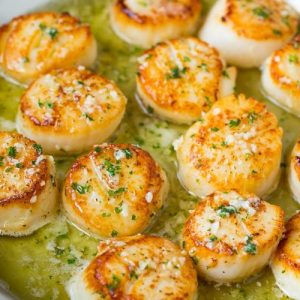
Garlic Butter Seared Scallops
Tender, golden-brown scallops seared to perfection and finished with a bright garlic butter sauce. This quick, protein-rich recipe delivers restaurant-quality flavor in just 15 minutes — ideal for busy nights or a special occasion.
Equipment
- 1 heavy skillet (preferably cast iron)
- 1 spatula or tongs
- 1 paper towel
- Measuring Spoons
- Knife and cutting board
- Small Bowl
Ingredients
- 1¼ pounds large sea scallops preferably dry-packed, fresh
- 1 tablespoon olive oil
- Salt to taste
- Freshly ground black pepper to taste
- 3 tablespoons unsalted butter
- 1 teaspoon minced garlic
- 2 teaspoons fresh lemon juice
- 2 teaspoons fresh herbs such as parsley or chives, finely chopped
- Lemon wedges for garnish
Instructions
- Preparing the Scallops for Searing: Begin by removing the scallops from their packaging and placing them on a clean cutting board. Using paper towels, gently pat each scallop dry on all sides. This step is critical because removing excess moisture ensures a perfect golden-brown sear rather than steaming. Avoid rinsing scallops under water, as it adds moisture. Once dried, season both sides evenly with salt and freshly ground black pepper to enhance flavor.
- Heating the Skillet for Searing: Select a heavy skillet, preferably cast iron or stainless steel, for optimal heat retention. Place it over high heat and add one tablespoon of olive oil. Allow the oil to heat until it begins to shimmer and is just about to smoke — this indicates it is hot enough for searing. A properly heated pan is essential for creating the rich caramelized crust scallops are known for.
- Searing the Scallops: Carefully arrange the scallops in the skillet in a single layer, ensuring they do not touch one another. Crowding the pan will cause the scallops to steam instead of sear. Let them cook undisturbed for approximately 2–3 minutes on the first side until the bottom develops a deep golden-brown crust. Use a spatula or tongs to gently flip each scallop to the other side, then cook for another 2–3 minutes. Scallops are done when they are opaque in the center and slightly firm to the touch.
- Removing Scallops from the Pan: Once cooked, transfer the scallops to a warm plate. Avoid stacking them, as this will cause them to steam and lose their crisp exterior. Loosely cover them with foil to keep warm while preparing the garlic butter sauce.
- Preparing the Garlic Butter Sauce: Reduce the heat on the skillet to medium-low. Add three tablespoons of unsalted butter and let it melt slowly. Once melted, add one teaspoon of freshly minced garlic. Stir constantly for about 30 seconds to release the fragrant aroma — avoid browning the garlic, as burnt garlic will create bitterness.
- Adding Flavor Enhancers: Once the garlic is aromatic, pour in two teaspoons of freshly squeezed lemon juice. Stir gently to combine, allowing the lemon juice to blend with the butter and garlic. Then sprinkle in two teaspoons of finely chopped fresh herbs such as parsley, chives, or tarragon. These herbs will add a bright, fresh flavor and a beautiful color contrast.
- Returning Scallops to the Pan: Carefully place the seared scallops back into the skillet, nestling them gently into the garlic butter sauce. Spoon the sauce over each scallop generously to coat them evenly. Allow them to sit in the sauce for 30–60 seconds so they absorb the flavors without overcooking.
- Plating and Garnishing: Using a slotted spatula, transfer scallops to serving plates. Spoon the remaining garlic butter sauce over the scallops. Garnish with additional chopped herbs and fresh lemon wedges for visual appeal and extra zest.
- Serving Immediately: Serve the seared scallops right away while warm. They are best enjoyed fresh to maintain their tender texture and vibrant flavor. Pair with a side salad, steamed vegetables, or a light pasta for a complete meal.
- Reheating Leftovers: If you have leftover scallops, store them in an airtight container in the refrigerator for up to two days. Reheat gently in a skillet over low heat with a small amount of butter, just until warmed through. Avoid microwaving scallops, as this can make them rubbery.
Notes
- Always use dry-packed scallops if possible, as they sear more evenly and develop a better crust.
- Pat scallops completely dry before cooking to avoid steaming and to ensure optimal browning.
- Avoid overcrowding the pan — cook scallops in batches if necessary to keep them crispy.
- Fresh herbs such as parsley, chives, or tarragon add brightness; feel free to experiment with your favorites.
- Serve immediately after cooking for best texture and flavor; scallops tend to lose their tenderness if left to sit too long.